
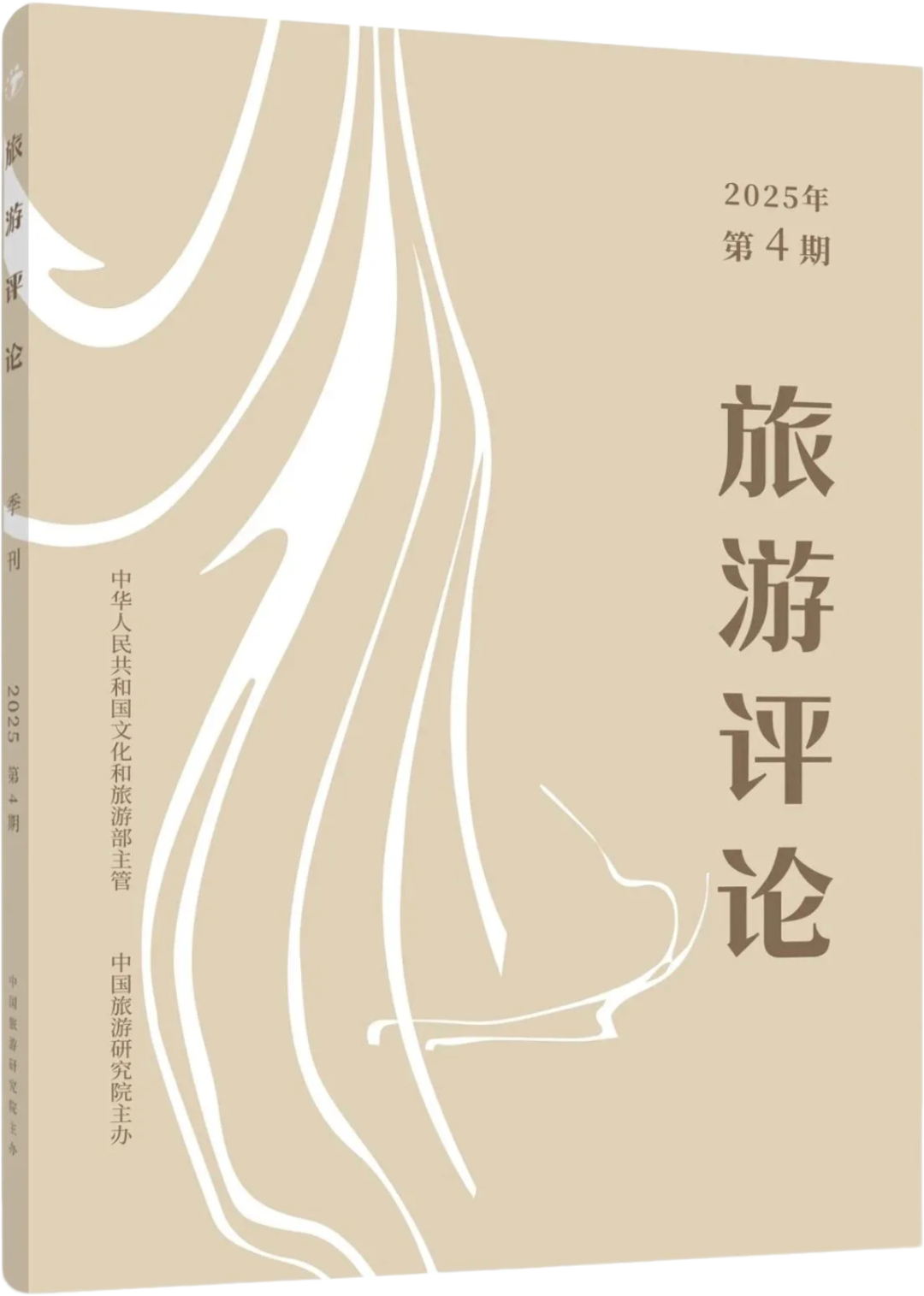
Foreword
As the concluding work of the first volume, 'Tourism Review' continues to adhere to the principle of 'practical thinking drives the practice of thinking', closely monitoring and rationally examining major issues, phased hot topics, and cyclical patterns in reality. This issue emphasizes the fundamental support role of statistics, data, and case studies in the construction of tourism theory and the high-quality development of the tourism industry. From the perspective of the writing style of the contracted author, implementing Xi Jinping's cultural ideology, implementing General Secretary Xi Jinping's important discourse and instructions on tourism work, constructing a national tourism development theory, and promoting the development of the region, enterprise, and field have become the ideological consciousness and action guide of theoretical workers. The practice of publishing in the past year has proved that the tourism industry in the new development stage urgently needs to implement the new development concept, promote the integration of culture and tourism, and build a new development pattern. In this process, theoretical articles with solid theoretical support, standardized academic paradigms, and clear goal orientation have strong theoretical vitality and practical influence, and are widely accepted by readers.
Tourism is an economic industry with strong cultural attributes, as well as a cultural industry with strong economic attributes. Establishing a comprehensive monitoring system for the development of tourism economy, regularly analyzing and judging the situation and development trends of tourism economy, and based on solid academic research and detailed data analysis, proposing theoretical viewpoints and countermeasures to guide the overall situation is not only necessary but also feasible. The special commentator team of this magazine, under the name of Lv Zhongping, has launched the first half year tourism economy review, stating that China's tourism economy is entering a new stage of prosperous development, and responding positively to some blindly optimistic and pessimistic views. At a critical stage of prosperous development in the tourism industry, it is important to show tourists the achievements and confidence in their growth. Theoretical work in the field of tourism requires both building capacity and strengthening the sense of struggle. Only with the courage to face challenges can there be a possibility of creating a new situation.
The city of 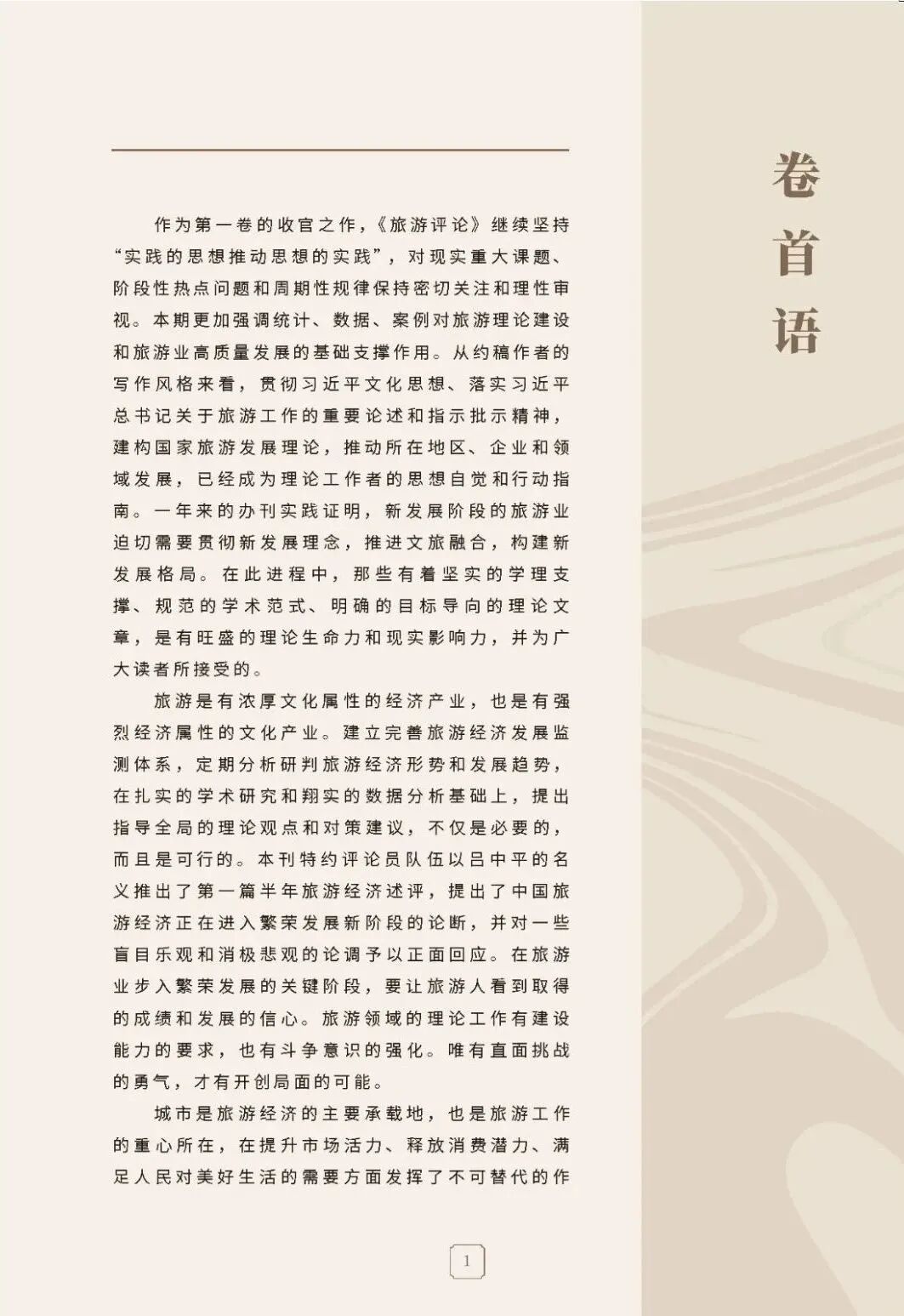 is the main carrier of tourism economy and the focus of tourism work. It plays an irreplaceable role in enhancing market vitality, unleashing consumption potential, and meeting people's needs for a better life. In this process, we should not only pay attention to the leading role of metropolises such as Beijing, Shanghai, Guangzhou, Shenzhen, Chengdu and Chongqing, as well as tourism cities such as Mount Huangshan, Lijiang, Guilin and Zhangjiajie, but also pay attention to the tourism development of regional central cities such as Cangzhou. For the latter, it is necessary to focus on studying its location advantages and the tourism and leisure potential of local urban residents. Based on the beautiful life of being close and far away, and sharing with guests, a new era regional tourism development strategy should be planned, rather than simply being guided by traditional resources. The transformation of this concept requires theoretical promotion, as well as a clear understanding of urban managers and broad consensus from all sectors of society, in order to timely transform the theoretical achievements of the new era into the spiritual driving force for promoting the development of the tourism industry. The theoretical article "Strengthening Cultural Empowerment and Stimulating Cultural Tourism Vitality" by Comrade Zhang Cai, Secretary of the Cangzhou Municipal Party Committee, is an effective exploration of this path.
is the main carrier of tourism economy and the focus of tourism work. It plays an irreplaceable role in enhancing market vitality, unleashing consumption potential, and meeting people's needs for a better life. In this process, we should not only pay attention to the leading role of metropolises such as Beijing, Shanghai, Guangzhou, Shenzhen, Chengdu and Chongqing, as well as tourism cities such as Mount Huangshan, Lijiang, Guilin and Zhangjiajie, but also pay attention to the tourism development of regional central cities such as Cangzhou. For the latter, it is necessary to focus on studying its location advantages and the tourism and leisure potential of local urban residents. Based on the beautiful life of being close and far away, and sharing with guests, a new era regional tourism development strategy should be planned, rather than simply being guided by traditional resources. The transformation of this concept requires theoretical promotion, as well as a clear understanding of urban managers and broad consensus from all sectors of society, in order to timely transform the theoretical achievements of the new era into the spiritual driving force for promoting the development of the tourism industry. The theoretical article "Strengthening Cultural Empowerment and Stimulating Cultural Tourism Vitality" by Comrade Zhang Cai, Secretary of the Cangzhou Municipal Party Committee, is an effective exploration of this path.
Tourism investment institutions and market operators, especially the top 20 entrepreneurs in the national tourism industry represented by China Tourism Group, have always been the main force in practical innovation and theoretical exploration. In the process of academic research, theoretical exploration, and journal construction, they have always been colleagues and our service targets. Comrade Bai Fan focused on building a tourism powerhouse and establishing a tourism powerhouse pilot zone in Beijing. He sorted out the five advantages of the First Tourism Group and planned five major improvement measures, using core capabilities to promote the development strategy of the First Tourism Group in the next five years, reflecting the era responsibility and initiative of large state-owned enterprises. Comrade Wang Zhenghua summarized the development process of Spring and Autumn Group's "low-cost tourism aviation" from the perspective of inclusive tourism, and explored how to transform and upgrade from "flying well" to "playing well", providing inspiration for private enterprises to achieve high-quality development of the tourism industry. Comrade Ding Yonggang is the main person in charge of Hangzhou Business Travel Canal Group. Starting from the changes in the urban cultural and tourism market and the trend of industrial development, he has sorted out the three major functions and five major capability systems of first-class urban cultural and tourism operators, and steadily constructed the guiding ideology and professional capabilities of the tourism group in the new development stage. Both state-owned and private tourism groups are the backbone forces that can be trusted and relied upon in the construction of a strong tourism country. Building a national tourism development theory, improving the modern tourism system, and promoting the stable and far-reaching high-quality development of the tourism industry cannot be separated from the main support of tourism groups.
Both the Hong Kong Special Administrative Region and the Macao Special Administrative Region have played an irreplaceable role in the process of building a tourism powerhouse in China. This issue invites Professor Huang Zhujun, President of Macau Tourism University, and Professor Xiao Honggen, School of Tourism and Hotel Management, Hong Kong Polytechnic University, to write articles on how Macau and Hong Kong's tourism industries can better integrate into the national development situation while promoting their own industrial structure transformation and upgrading. The collaborative innovation model of "Hengqin Space of Macau Resources" proposed in the article, as well as the promotion of Hong Kong tourism from "flow oriented" to "experiential, value oriented, and governance oriented" through institutional innovation, public participation, and cross-border collaboration, have theoretical inspiration and practical guidance significance for Macau's construction of a world tourism and leisure center and Hong Kong's construction of a new urban paradigm for high-quality tourism development.
Three articles from mainland universities and research institutions have reference significance and value for the formulation of national and local tourism development plans during the 15th Five Year Plan period. Professor Cui Fengjun, Secretary of the Party Committee of Shaoxing University of Arts and Sciences, has put forward four targeted strategies from a local perspective, including unbalanced development, market-oriented reform, strengthening technological leadership, and optimizing governance structure. Among them, suggestions such as launching county-level tourism promotion plans and cultivating tourism talents are particularly practical and targeted. Professor Zhang Chaozhi from Fudan University has long been engaged in research on the integration of culture, cultural relics, and tourism. Based on summarizing the investment driven tourism development model of the past 20 years, he has identified the development trends of the tourism industry in the next five years from two aspects: changes in tourism market demand and government resource management policies. The suggestions for the development plan of the national tourism industry during the 15th Five Year Plan period are both highly theoretical and practically feasible, and are worth reading. Dr. He Qiongfeng, Director of the Statistical Survey Institute of the China Tourism Research Institute, has put forward suggestions for the construction of a modern tourism statistical system based on years of practical experience in tourism statistics, including strengthening statistical functions, improving statistical systems, optimizing collection systems, enhancing statistical quality, as well as supervision, guarantee, and talent cultivation. This is a practical measure to lay the foundation and establish a long-term development for the tourism industry.
Meeting with readers in this issue means that Travel Review has completed its first year of publication. Despite the best efforts of the editorial board and team, as well as the recognition and encouragement from the government, industry, academia, research, and various sectors of society, and the establishment of a certain level of fame and influence, the journal still has many shortcomings in terms of manuscript quality and layout presentation compared to the requirements of the competent authorities and local and industry expectations. We are willing to fully listen to the opinions and suggestions of all sectors of society, rely on the strength of a professional team, continuously improve the quality of publication, enhance theoretical authority, targeted comments, and readability of text. We will strive to provide better services to our readers with higher quality starting from the publication of Volume 2, Issue 1 on January 1, 2026.
Editorial Department of this magazine
August 28, 2025
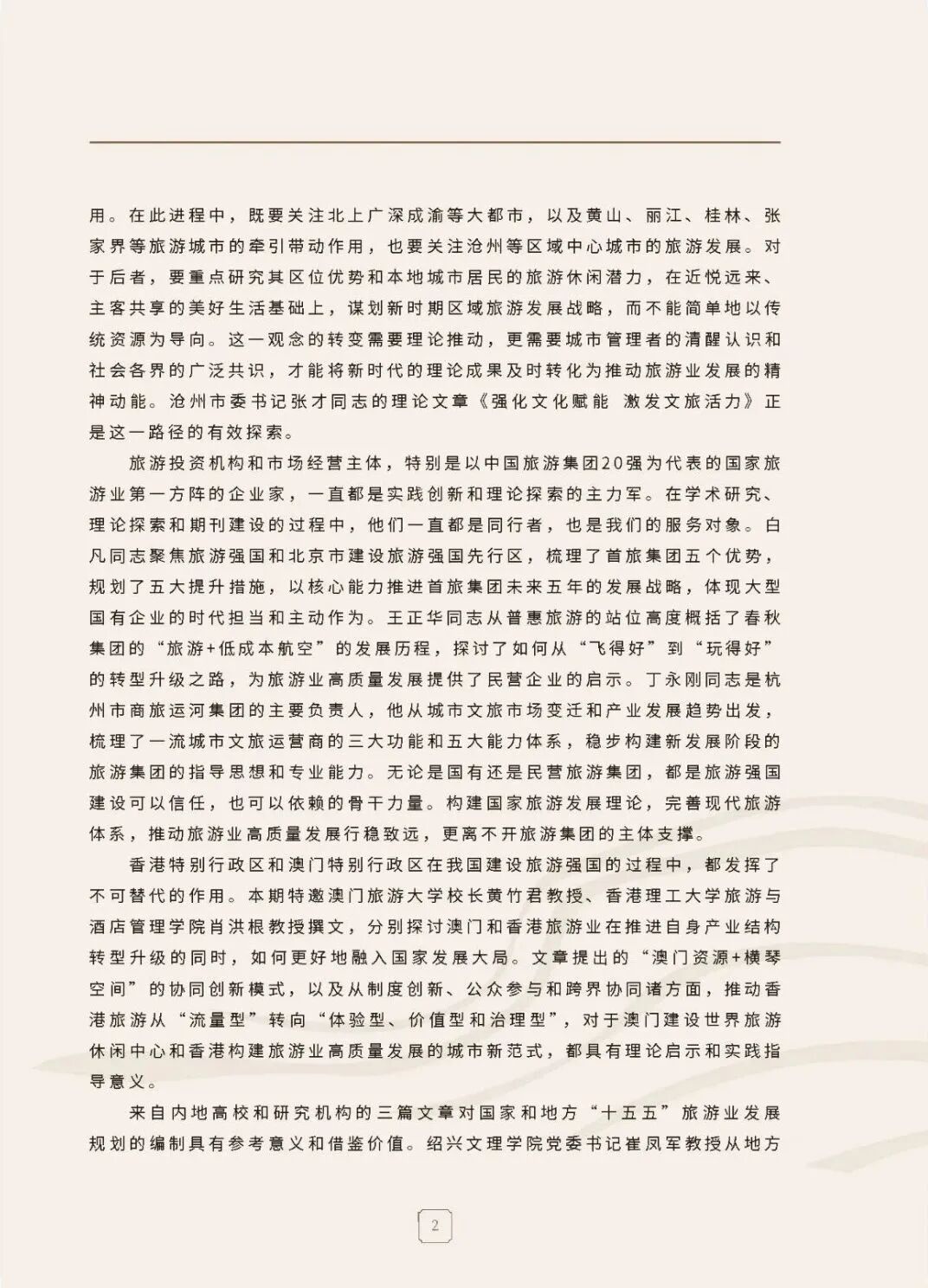
catalogue
Lv Zhongping
The tourism economy is entering a new stage of prosperous development
——Review of Tourism Economy in the First Half of 2025 and Outlook for the Second Half
Zhang Cai
Strengthening cultural empowerment and stimulating cultural tourism vitality
——Practical Analysis of Building a Modern Cultural and Tourism Industry System in Cangzhou City
Bai Fan
Implement five major improvement measures to promote the construction of world-class cultural and tourism enterprises
——Strategic thinking based on the "15th Five Year Plan" of First Travel Group
Wang Zhenghua
From 'flying well' to 'playing well', low-cost airlines activate vacation travel
Ding Yonggang
Based on the three major positioning and forging five capabilities, we aim to build a first-class urban cultural and tourism operator in China
——Reflections on the Practice of Hangzhou Business and Tourism Canal Group
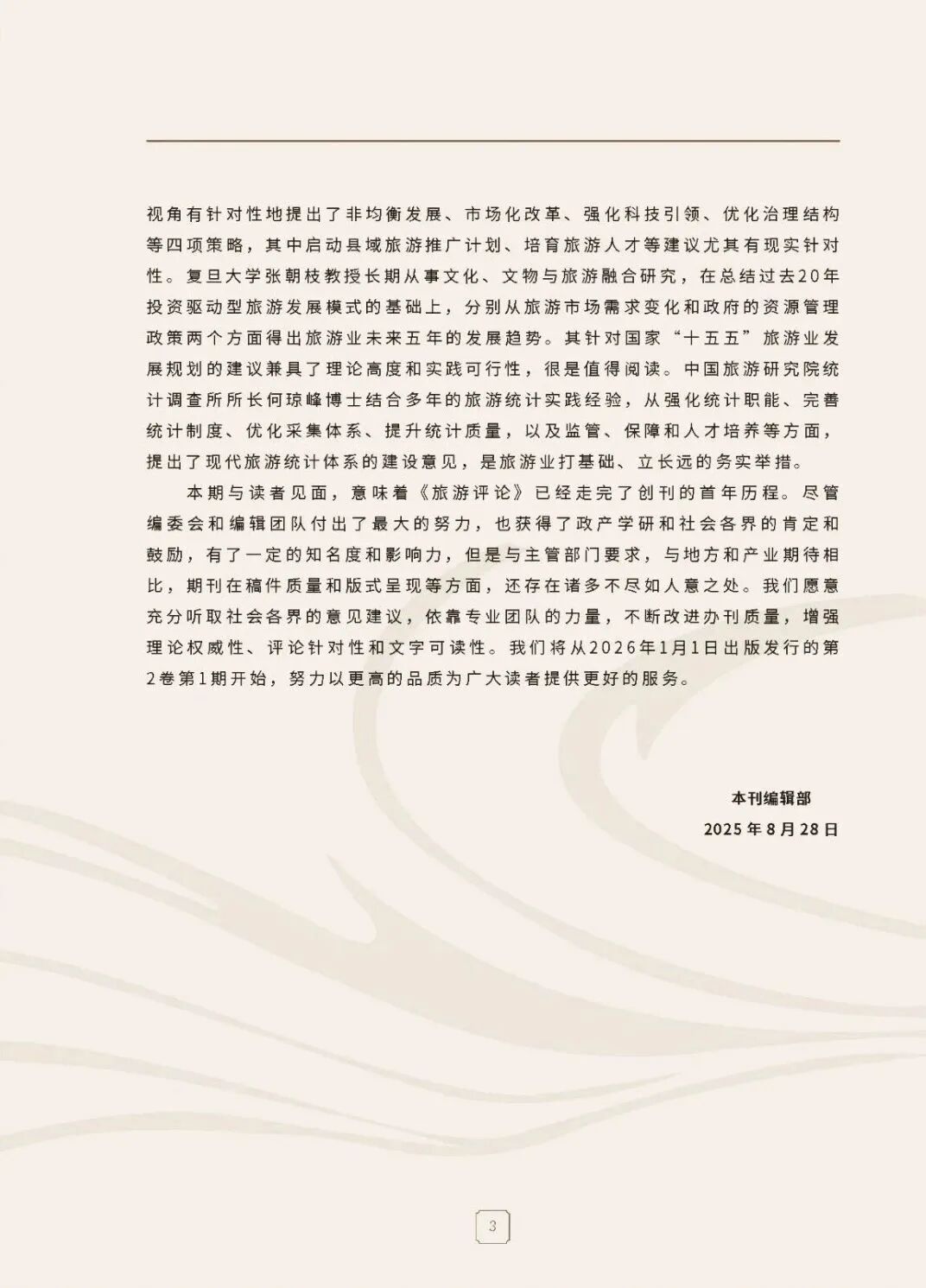
Huang Zhujun, Lin Jingzhi
During the 15th Five Year Plan period, the integration of Macao's tourism industry into the overall national development path
Xiao Honggen, Zhang Aojia
Research on the high-quality development path of Hong Kong tourism based on the "Hong Kong Tourism Development Blueprint 2.0"
Cui Fengjun, Dong Schwann
Strategic choices and countermeasures for high-quality development of local tourism industry in China during the 15th Five Year Plan period
Zhang Chaozhi
Basic situation assessment of tourism industry development during the 15th Five Year Plan period
He Qiongfeng
Accelerate the construction of a modern tourism statistical system to serve the high-quality development of the tourism industry
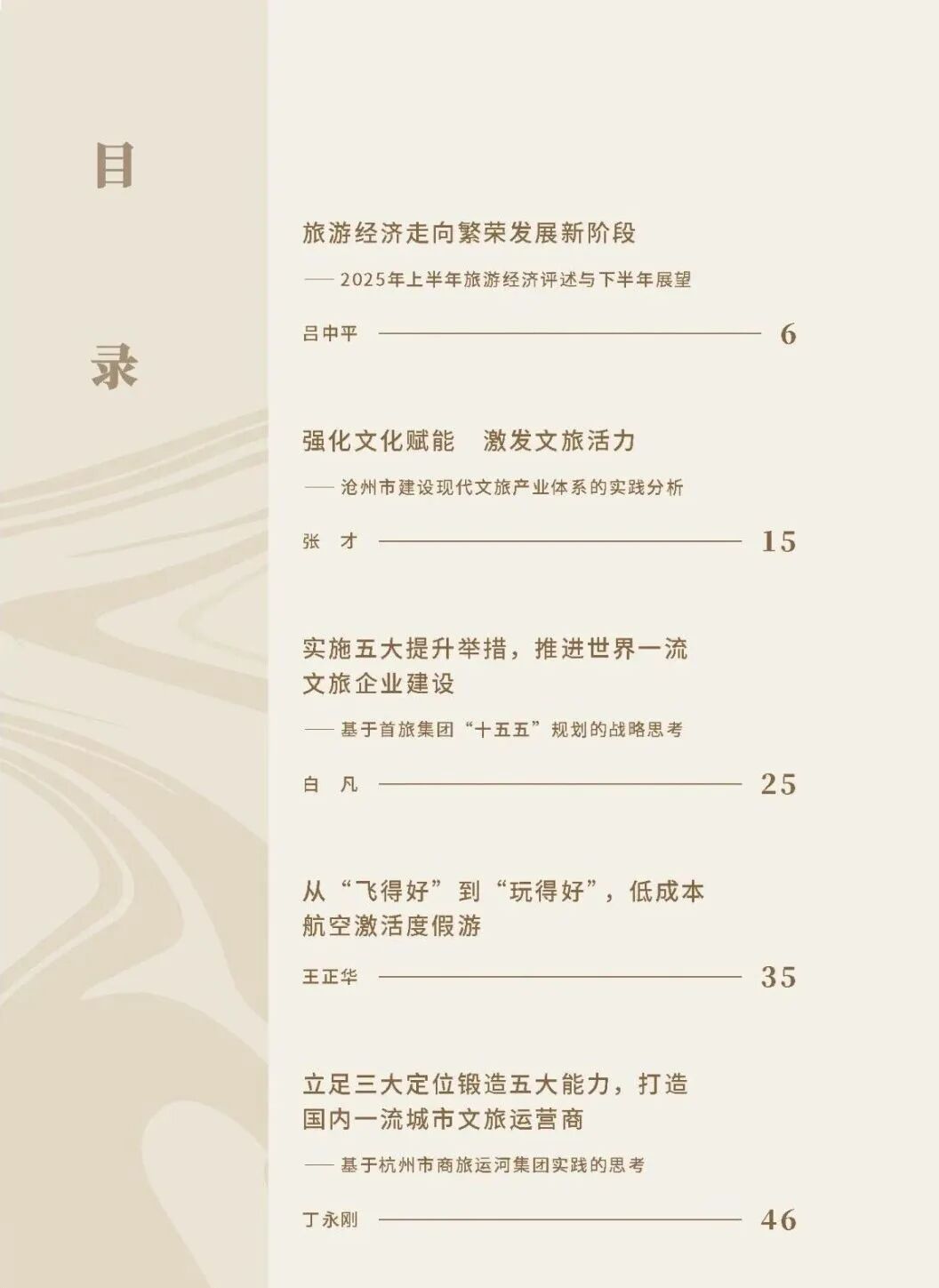
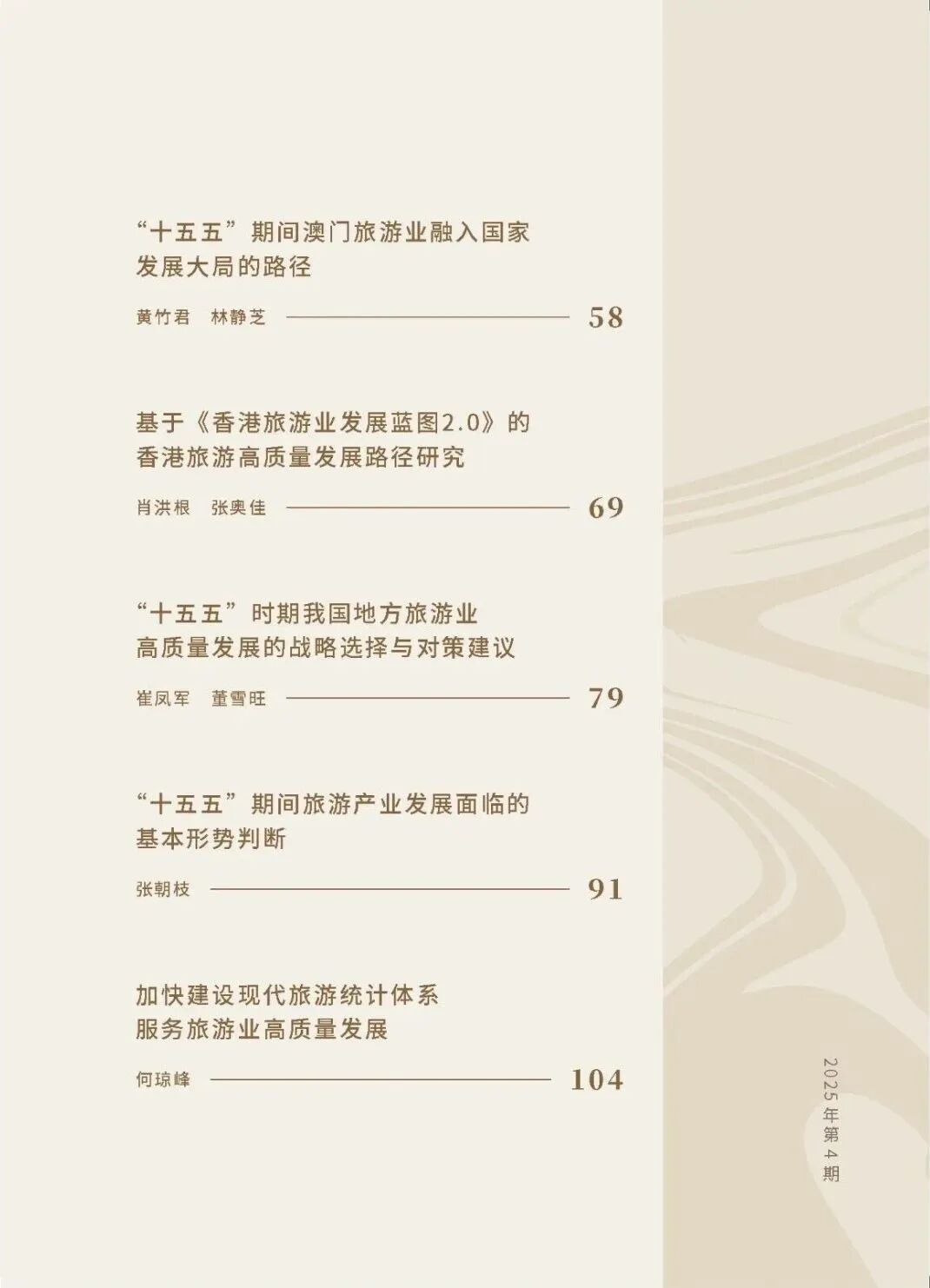
Source | Editor in Chief of China Tourism Review | Liu Xin Please indicate the source when reprinting
